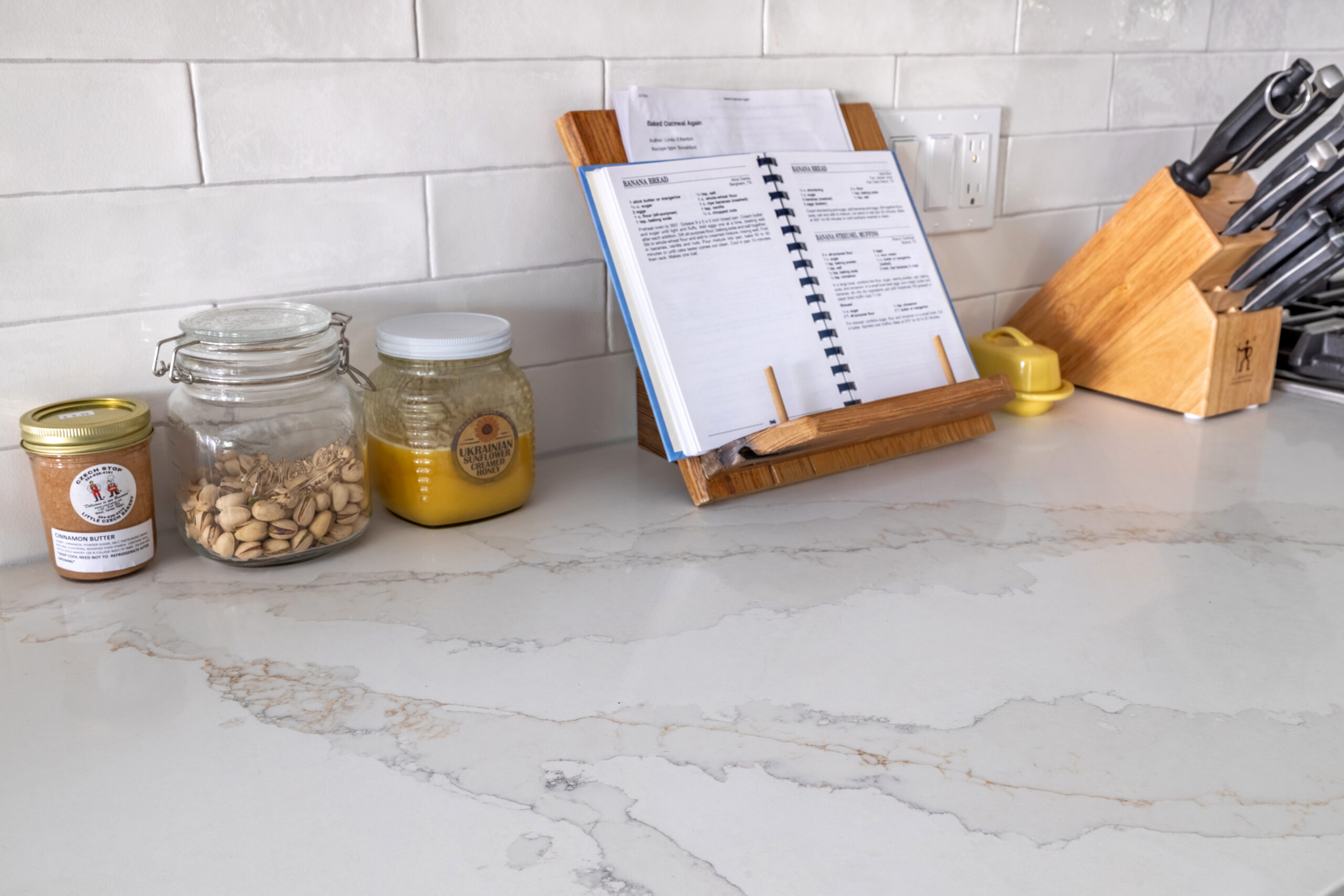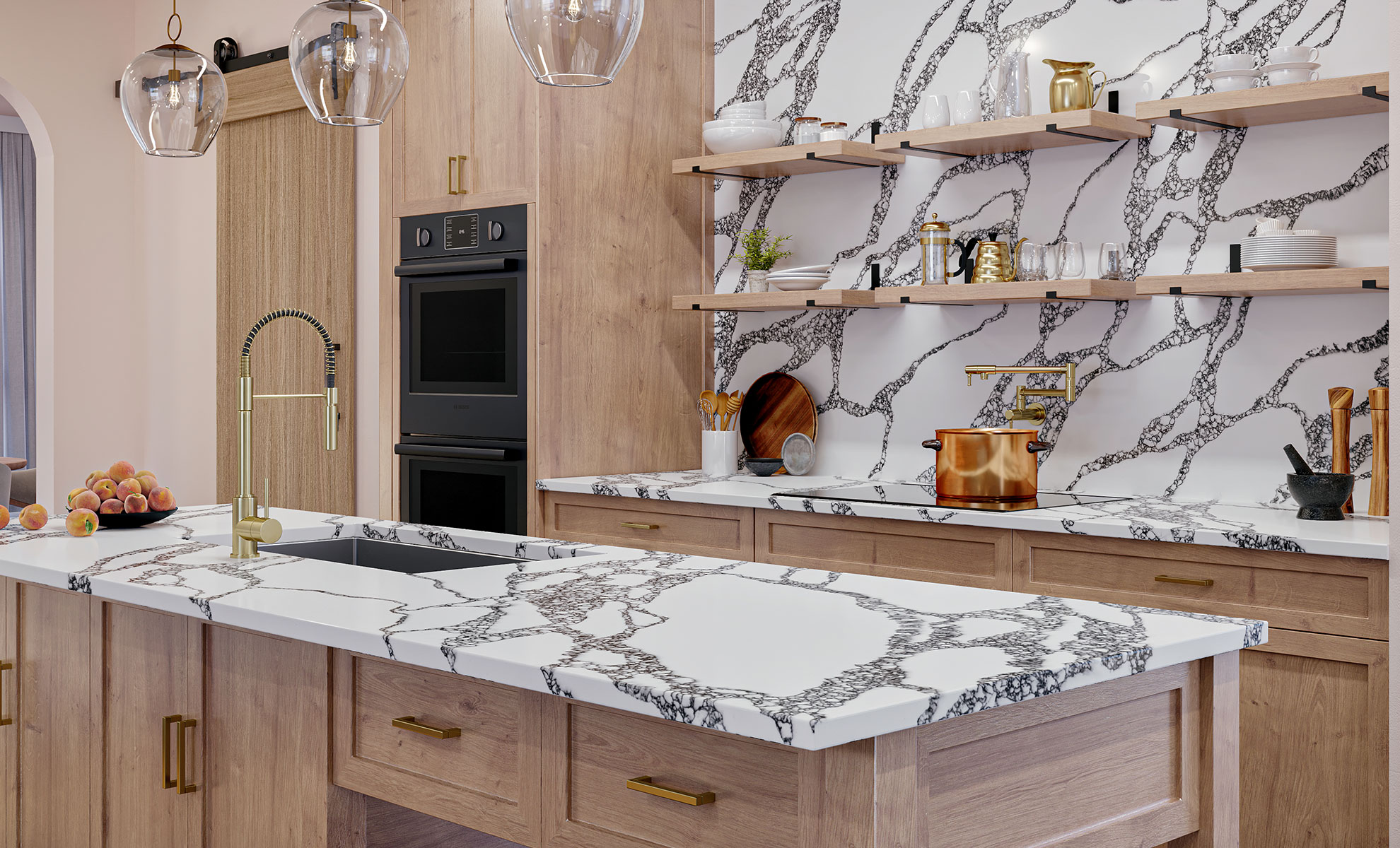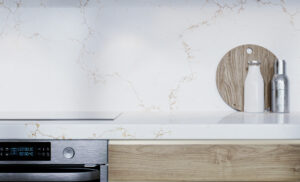To ensure you pick the perfect quartz surface for your space, understanding quartz countertop vein colors is essential. Quartz countertops come in various grades, each with distinct qualities affecting color richness and veining patterns.
Veins vary in size, color and distribution across the polished or honed slabs, providing unique aesthetic choices. To help you make the right choice for your home, let’s explore everything you need to know about quartz countertop vein colors.
Origin and Composition of Quartz Countertops
Quartz crystals are one of the most abundant minerals found in the earth’s crust, made of silicon and oxygen atoms bonded together in a continuous framework. Quartz is very hard, registering a 7 on the Mohs hardness scale. It is found in granite, which is one of the materials that quartz aims to simulate and replace as a countertop surface.
Quartz countertops, also known as engineered stone countertops, are made by combining ground natural quartz crystals with resin and pigments. The exact ratio can vary by brand and specific variety, but quartz countertops typically contain over 90% ground quartz combined with 7-10% binding resins and polymers and a small amount of pigments. The mixture is molded into slabs using vacuum and vibration and then compacted under pressure. This compaction fuses the materials together into an impermeable, non-porous surface.
The quartz slabs are molded to a thickness of 1.2-3 cm. Their non-porous nature allows thin slab fabrication while maintaining strength. The surface is then polished to create the desired finish. Slabs come in set dimensions, typically about 160 centimeters x 305 centimeters.
For installation, slabs are cut to size and installed in a similar fashion to natural stone using adhesive. Precise fittings, seams, edges and cutouts can be made thanks to quartz’s workability.
Role of Pigments in Quartz Color Variation
Adding pigments allows quartz manufacturers to create slabs in a vast array of colors — from solid white to black, beiges, browns, grays and more. Pigments can also create veining and patterns to simulate natural stone that looks like marble.
While the base quartz material remains constant, the type and amount of pigments added greatly affect the final look. For example, white slabs contain no pigment while dark grays and blacks contain more. Adding selectively blended pigments creates realistic veining in some quartz varieties.
Certain pigments are used to achieve popular granite-like patterns. Metal oxide pigments create flecks while colored polyester creates overall background tones. The fabrication process swirls these together to form unique, nature-inspired visuals.
The variety of pigment blending allows unlimited customization of quartz colors and patterns. Specialized techniques like digital 3D imaging can precisely replicate premium natural stones like marble and granite.
Exploring Quartz Countertop Vein Colors
While laminate and granite countertops can be an attractive addition to your home, nothing compares to the dynamic elegance of a veined quartz countertop. Let’s take a closer look at quartz countertop vein colors and their particular features.
Overview of Quartz Vein Colors
While solid-color quartz countertops are a great choice, the most popular quartz options feature some degree of veining. The veined quartz patterns and colors have a significant impact on the overall look and feel of the countertop. When selecting quartz for your home, it’s important to understand the range of vein styles and colors on the market.
Popular Quartz Vein Colors on the Market
Some of the most sought-after quartz countertop colors feature white or light gray base tones with dramatic dark gray or black veining. These color combinations emulate luxury Italian marble like Calacatta Gold, Calacatta Belleza and Statuario. Bright white quartz with minimal gray veining is also popular for contemporary kitchens.
For a warmer aesthetic, tan and cream-colored quartz with caramel, gold, brown or rust-colored veining can resemble natural stones like marble or granite. Macchia Vecchia Calacatta is a popular warm-toned quartz in this color family.
How Vein Color Affects Overall Look of Quartz Countertops
The vein color plays a significant role in the overall look of the countertop:
- Dark dramatic veins against a light background create visual contrast and a bold, striking look. The dark veining makes light quartz resemble natural stones like Calacatta marble.
- Minimal veining allows the base color to take center stage. A nearly vein-free white quartz countertop creates a clean, bright, contemporary aesthetic.
- Warm-toned veins bring an earthy, organic feel that pairs well with wood cabinetry and finishes. Cool-toned gray veining looks more modern and fits with contemporary color schemes.
- Heavy veining with lots of movement has high visual interest. More uniform, subtle veining than granite has a more consistent, streamlined look.
The color and style of veining should coordinate with your cabinetry, flooring, backsplash and overall kitchen or bath design for a cohesive look. Visit quartz suppliers to view slabs in person when selecting your perfect vein style.
Choosing the Right Quartz Vein Color for Your Space
 When selecting a quartz countertop for your kitchen or bathroom, one of the most important decisions is choosing the right vein color. The veins in a quartz slab create visual interest and depth, bringing your kitchen countertops to life. However, with so many vein color options available, it can be overwhelming to select the perfect one for your space.
When selecting a quartz countertop for your kitchen or bathroom, one of the most important decisions is choosing the right vein color. The veins in a quartz slab create visual interest and depth, bringing your kitchen countertops to life. However, with so many vein color options available, it can be overwhelming to select the perfect one for your space.
Factors Influencing Vein Color Selection
There are several key factors to consider when choosing a quartz vein color:
- Cabinetry color: Look at the color of your existing or planned cabinets. You’ll want to select a vein color that complements the cabinet finish. For example, whites and light grays pair well with both light and dark cabinet colors. Bolder veins like blacks and blues tend to look best with lighter cabinets.
- Overall color scheme: Take into account the colors used throughout your kitchen or bath. Choosing a vein color that ties into your overall color palette will help the space flow. If you have cool-toned grays and blues, go for a bluish or grayish-white quartz. For warm wood tones, creamy whites with golden veining are nice.
- Lighting: The vein color will look different under natural, incandescent and LED lighting. Cooler tones like grays show up better under LEDs while warm lights bring out golden tones. If possible, view slabs under lighting similar to your space.
- Personal preference: While trends come and go, your quartz countertops will likely be in place for years to come. Selecting a color and patterning you’ll enjoy long-term is key.
Matching Vein Colors with Kitchen Decor
Here are some popular quartz vein colors and the kitchen styles they pair well with:
- Whites pair beautifully with both light and dark cabinet colors. The crisp white background illuminated by delicate feathery gray veins is versatile enough for any kitchen decor.
- Light grays are ideal for transitional spaces with a mix of wood, painted or white cabinets. The soft gray background with white marbling is neutral but still adds visual interest.
- Bolds pair best with light cabinets or colorful mosaic backsplashes. Their dramatic white and gray patterning stands out against darker woods.
- Creams blend beautifully with medium to dark wood finishes. Warm creams with tan, gold and brown veining add dimension while coordinating with maple, cherry or oak cabinetry.
Understanding Lighting and Quartz Vein Colors
The type of lighting in your kitchen or bathroom impacts how quartz vein colors are perceived:
- Natural lighting: Illuminates veins and movement in the stone. Grays, blues and bold patterns are enhanced under natural light. Warmer tones like tans and golds may be muted unless complemented with fixtures.
- Incandescent lighting: Adds a warm cast that accentuates tan, brown and gold veining. Cooler grays and whites may look dull under all incandescent lighting.
- LED lighting: LEDs bring out the crispness of grays and bright whites. However, on their own LEDs can look clinical. Mixing LED with other light fixtures helps balance the temperature.
- Combination lighting: Layering pendant lights, under-cabinet lighting and natural sunlight cast the most flattering light across all vein colors. It highlights variation and depth while keeping the colors accurate.
Be sure to view quartz slabs under lighting similar to your kitchen or bath. This will give you the most realistic idea of how the vein color will look in your unique space.
Rely on Vadara Quartz to Transform Your Space
Are you looking to install a quartz countertop in your home? Look to the experts at Vadara Quartz. Our mission is to provide quality, artistry and craftsmanship to bring you timeless quartz collections. By fusing our meticulous work with the unparalleled resilience of quartz, we deliver quartz surfaces that capture natural wonder and transform your spaces into timeless masterpieces.
We believe that every moment and every space has the potential to transform your everyday experience. Let our surfaces become a canvas for your vision. Explore our collections today or contact us to learn more.



